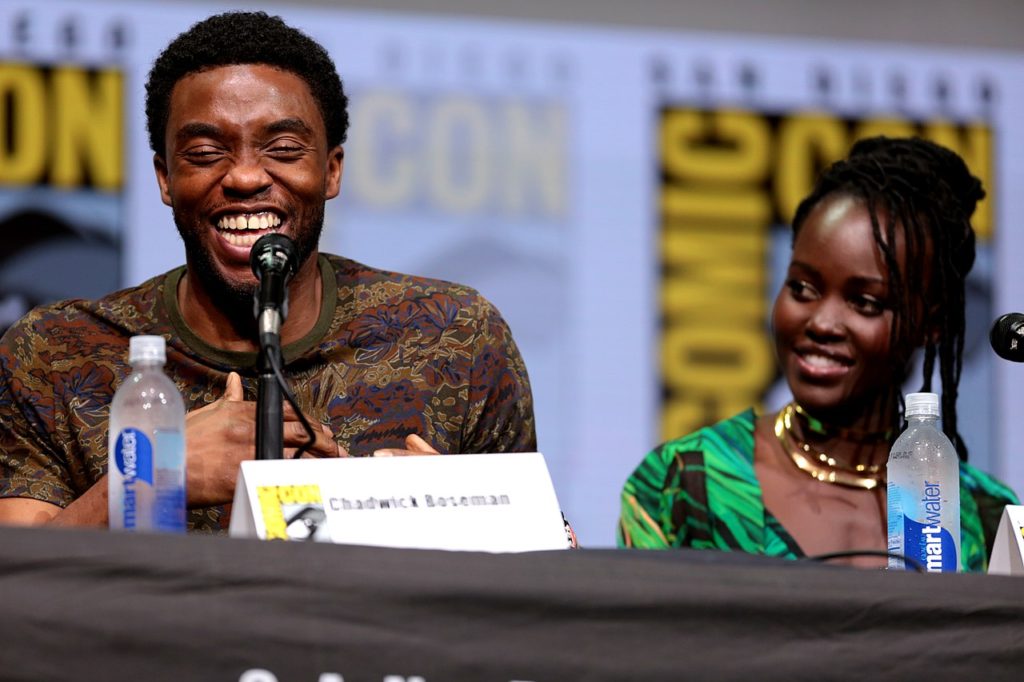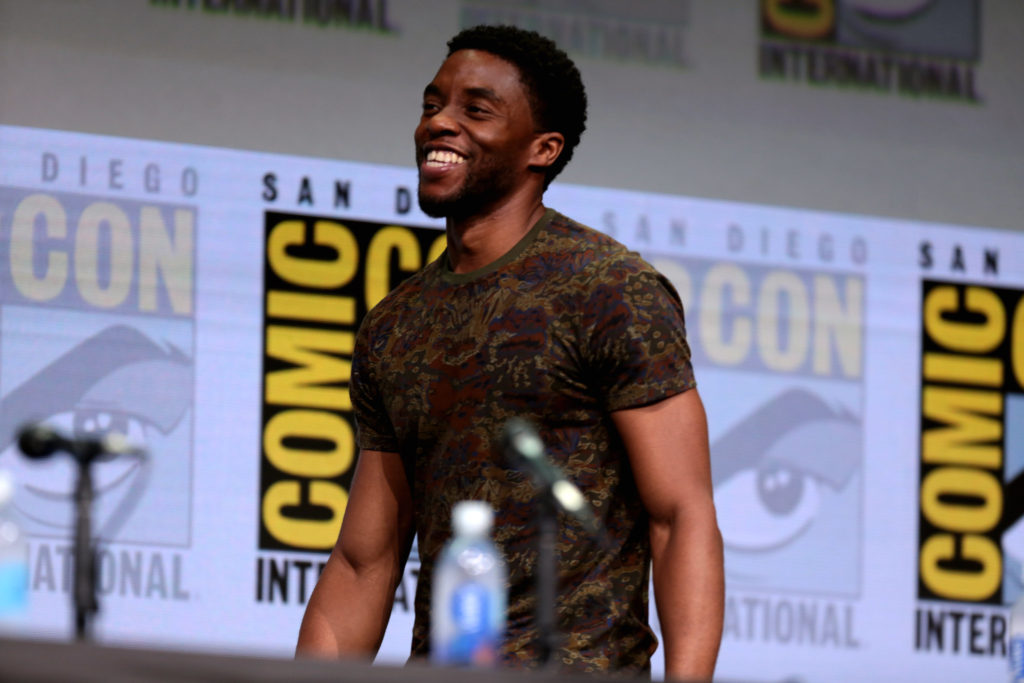When, in August 2020, celebrated actor Chadwick Boseman succumbed to a four-year battle with colon cancer, the loss was felt globally. A few days after the launch of his final screen performance in Ma Rainey’s Black Bottom (2020), colleagues and friends continue to bear testimony to Boseman’s upstanding character.
This year has been one of many unprecedented losses and disturbances felt across the globe. The Covid-19 pandemic which ushered in an unavoidable global economic crisis brought on additional trials for women in the media. And as many establishments remain largely untransformed where gender is concerned, the character of male leaders sat at the centre of the experiences of women during this time.
After the untimely passing of African American actor, Chadwick Boseman, news and social media was filled with tributes to the man who portrayed King T’Challa in the Hollywood blockbuster movie, Black Panther (2018). The life that the actor led was one that touched many across the globe. And as a man who played many roles in a range of films, Boseman seems to have left an indelible mark on his fellow co-stars – contrary to what we often hear as a recurring trait among male stars in the industry.
For women, who are often on the receiving end of male egos manifesting in unpleasant and, at times, violent ways, Boseman’s character was a welcomed alternative. In his personal life and on-screen, Boseman was able to expose to the continent an alternative form that African masculinities can embody.
Recently, the Congress of African Journalists (CAJ) made its repeated calls to the African Union to attend to the growing threats of violence on journalists in their attempts to uncover corruption on the continent. According to CAJ, “Female journalists are particularly vulnerable to gender-based violence, sexual and verbal harassment, as well as online abuse”.
In an online study, Amnesty International found that “1.1 million abusive or problematic tweets were sent to women last year – an average of one every 30 seconds”. Furthermore, women of African descent were 84% more likely to be the target than those of European heritage.
Further compounding the issue, a UN study, done in a period covering 13 years, between 2006-2019, found that “1,200 journalists have been killed for reporting the news and bringing information to the public”. And in most cases “nine out of ten” perpetrators of violence go without facing the law. Commenting on these findings, UN Secretary-General António Guterres went on to state that: “If we do not protect journalists, our ability to remain informed and make evidence-based decisions is severely hampered”.
And in Kenya, 73% of female journalists reported that they are “highly likely to experience sexual harassment during assignments” in a study done by the Media Council of Kenya (MCK). The harassment includes amongst other things:
- Sexual advances, propositions, suggestions or pressure for sexual activity at or outside work.
- Someone displaying sexually explicit pictures in your space or a shared space, such as at work
- Suggestions that sexual favours may further a person’s career, or that refusal of such may hinder it
- Receiving emails or text messages with sexual content
- Non-verbal conduct, such as staring or gestures.
These behaviours noted by the MCK point to a societal problem that mirrors the values males are raised to enshrine – at the expense of girls and women.
In society, we learn more by seeing and imitating others than we do by following instructions. Much more so when it comes to constructing our identities. The image of masculinity that has been cast by African men over the years leaves much to be desired. Not only is patriarchal cruelty rampant, but men are more and more alienated from themselves. When patriarchy indoctrinates a boy to see himself as superior simply because of his biology, he is practically wrenched from his core and stunted in his emotional growth. This abhorrent behaviour is then somehow justified.
But then came along Chadwick Boseman. Before his passing in August 2020, he had honed his flawless skills as an actor in his earlier movies: Get on up, 42, Draft Day, and others. He brought, in all of his on-screen time, a contemplative type of African American masculinity. Anger was not his first reaction. Nor was domination. And as the viewer, one could sense his gentle spirit and also notice him grappling, on the inside, with masculinity’s most important questions: what does it mean to be a man? & And can manhood be defined outside dominating a woman? He seemed to be reflecting on himself and the appropriate ways to walk in the world as a man of integrity.

By the time he portrayed the King of Wakanda, in the 2018 blockbuster movie, the Black Panther, Boseman had become adept at expressing multiple conflicting emotions in his characters. With T’Challa, Boseman stayed true to the existential angst facing African men: the cognitive dissonance between the public man of integrity and the private man of domination. But Boseman linked it with a strong internal core shown in his gentleness, coupled with a strength of character to carry the heavy burden of responsibility. He did not impose himself on others nor did he project his insecurities. He considered his actions and led with compassion.
According to “The safety of women journalists: Breaking the cycle of silence and violence”, a study commissioned by International Media Support, women journalists are more often targets of sexual violence than male journalists. This is the unfortunate reality of our societies. “Women are subject to a particularly damaging brand of vitriol that includes, in high volume, explicit threats of sexual violence, personal insults, and circulation of private information or demeaning images,” the report reads.
And the detriment of this behaviour is that, “gender inequality is entrenched within the media sector and societies, manifested in unequal pay, low numbers of women able to advance to the decision-making levels and tolerance or lack of protocols when it comes to sexual harassment by colleagues, sources or interviewees.”
In the 2019 movie, 21 Bridges, Boseman made a remarkable gesture of solidarity with the growing Equal Pay Movement in the United States entertainment industry. As a lead actor and producer, he gave up part of his salary to a female co-star after the studio executives refused to close the pay gap. On its own, Boseman’s action does not solve an entire systemic and structural issue of society. But yet it is a beacon of light, in a dark cloud of misogyny, for other men to notice and act accordingly.
The common denominator, of course, is the culture of domination that patriarchy has established within society, which has run over to every other sector, and in particular the media. Women journalists are placed in a position where they must carry and elevate the stories of society whilst living in it. To avoid racism, one can simply move away from the oppressive group. But where do women go to avoid men and their vitriol, when, as journalists and reporters, they are often sent into the valley of the hyenas for the sake of the story.
According to a survey conducted by the International Women’s Media Foundation (IWMF), titled, Attacks and Harassment: The impact on female journalists and their reporting, “nearly 2 out of 3 respondents said they’ve been threatened or harassed online at least once — slightly more, reported physical threats or harassment. Of those, approximately 40% said they avoided reporting certain stories as a result of online harassment”.
This patriarchal cruelty is not new nor is it exclusive to women in the media. It is a small cross-sectional view of the endemic challenges women face every day. And at the root of it is the masculine insecurities of men and their corrupting desire for respect at all costs. Patriarchy indoctrinates men into delusions of grandeur which expresses itself in narcissistic behaviour of physical, emotional and psychological abuse. Women should not have to avoid work opportunities in favour of their safety. Men need to heal from their neurosis in order for women to be safe at work.
Perhaps Chadwick Boseman is a worthy example for men to look up to. His masculinity, especially in his portrayal of King T’Challa, leaves out all the unnecessary bravado of a low self-esteem and finds affirmation in being emotionally engaged by those around him. T’Challa’s relationship with Shuri, played by Letitia Wright, is a welcomed addition to a different image African men can aspire to. T’Challa could be seen joking around and even being embarrassed by his sister on screen. And yet he took it all in jest- his self-esteem was anchored and not easily wounded.

According to American Feminist, bell hooks, in her book We Real Cool: Black Men and Masculinity:
“Healthy [African-American] males in our society do not fall for the patriarchal hype. They attain emotional well-being by learning to love themselves and others.”
According to a recent study on the IMPACT OF COVID19 ON EAST AFRICAN WOMEN JOURNALISTS, and which was supported by UNESCO’s International Programme for the Development of Communication, found some convincing results on the need to strengthen the power, role, and skills of Women in media.
Since Covid-19 has “propelled journalists to the frontline” media practitioners have had to grapple “with the impacts of the pandemic on their lives and work”.
The study was done through an online survey covering several countries in East Africa: Rwanda, South Sudan, Tanzania, Uganda, and Kenya. And out of the 108 respondents, the study found that 52% were “hard-hit economically”, 69.4% reporting to have moved their work mainly online with 62% using their own money for data costs.
Further compounding the problem for Women in media is how sexual harassment had now moved further online, thereby reaching them in their own work-home environment. 63.9% reported having experienced harassment online.
“Some women journalists(43.5%) did not have employer-supplied protective gear. A majority, 69.7%, reported elevated levels of stress and worry over their welfare, and almost half, 46.3%, reported not having employer-provided psychosocial support,” reads the reports.
The study also makes some recommendations which include among other things, strengthening media organisations and women associations to safeguard women; digital security training and entrepreneurial skills training for freelancers.
To end patriarchal violence, men will have to tally the benefits that toxic masculinity provides them and the expense of it. And indeed the price is high for men who neglect their emotional wellbeing and choose domination and cruelty instead. However, women all over the world are organising themselves to fight the patriarchy. Men need to join along and fight it within and without. There is another way, which Chadwick Boseman has already paved, for men who desire emotional well-being. One only needs to look, learn and become.



